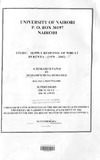| dc.description.abstract | Wheat production in the country has continued to decline over the years while consumption of wheat related products have continued to increase. This scenario makes a large portion of the domestic consumption to be imported to bridge the ever increasing gap hence eroding our foreign
currency reserves.
This study looks at those factors that affect supply of wheat in the country. Among those that were found to have significant influence included, cost of inputs, structural adjustment programmes, time trend (which also captured technological development) as well as hectarage planted in the previous period. How then can we correct the above to ensure adequate production is realized to satisfy the ever increasing demand?
Based on the findings of the study policy recommendations have been suggested which can remedy the situation. This includes the government's crucial roles of adequately funding research and extension services, credit provision through AFC and strengthening marketing functions in order to
encourage increased domestic production of wheat. It has further been
suggested that where the government is not able to fully satisfy those conditions, then the private sector should be invited to do so, provided proper mechanism is put in place to ensure that farmers are not exploited but instead realize their full potential. | en |

